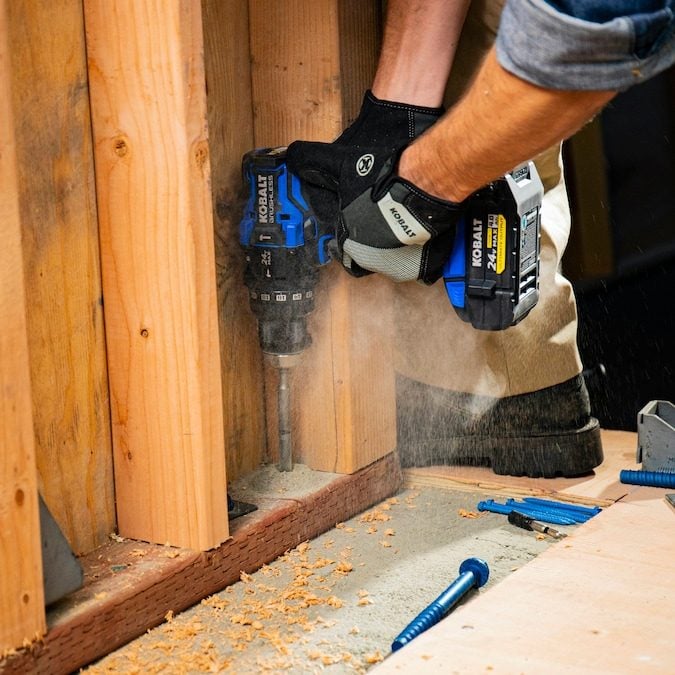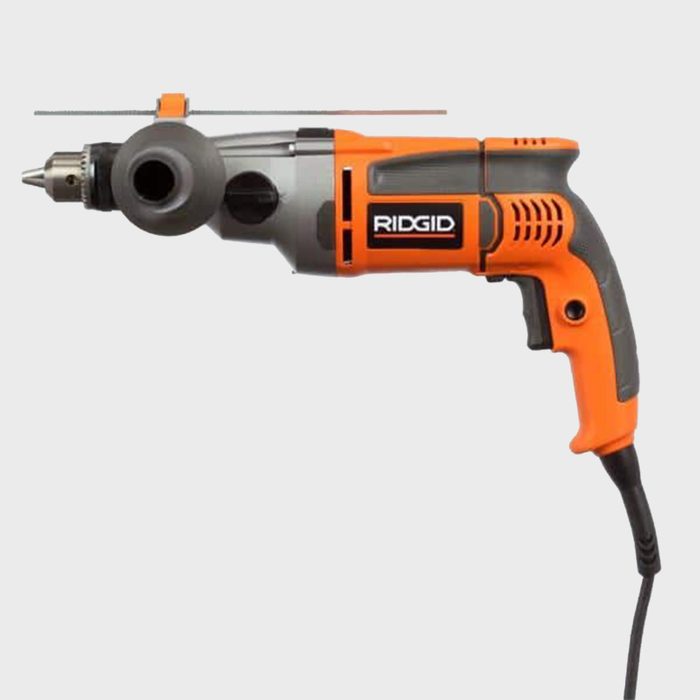
Best Overall Value Corded Hammer Drill
There are lots of hammer drills on the market, with a wide range of features and prices. The perfect balance between price and performance depends on how often you’ll use the drill and what kind of work you’re planning to do. But for most DIYers, the Ridgid R50111 Hammer Drill is a strong choice.
The steel gears and all-metal case stand up to abuse and reduce heat build-up. It features a 1/2-inch keyed chuck, variable speed trigger and two-speed selector. The optional side handle has a 360-degree range, letting you find the perfect spot to provide support without interfering with your line of sight.
It comes with an eight-foot power cord and a three-year warranty, along with Ridgid’s lifetime service plan.
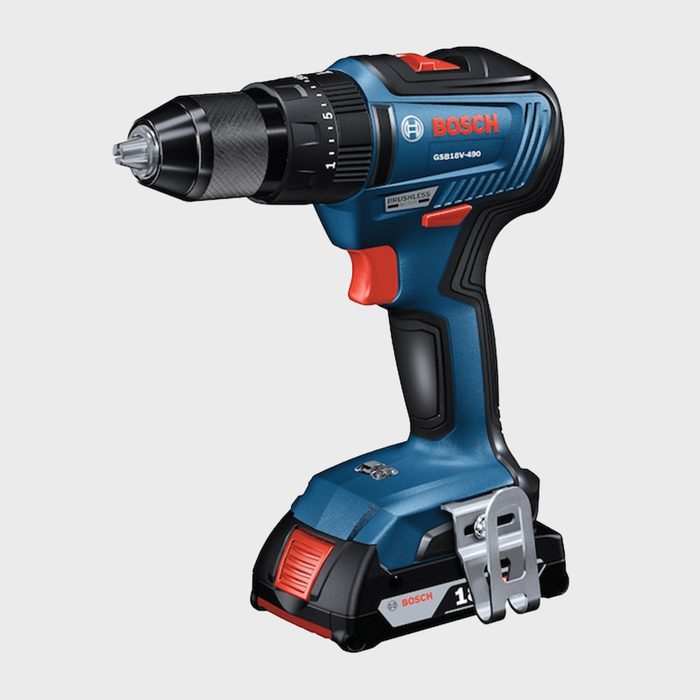
Best Overall Value Cordless Hammer Drill
The Bosch GSB18V-490B12 brings serious cordless power on a DIYer’s budget. The drill can switch between hammer drill, drill or driver modes, making it an extremely versatile tool. It comes with a 1/2-inch keyless chuck, a mid-body grip and a brushless motor that can deliver up to 22,000 bpm.
It also features variable speed, with a two-speed gearbox and 20 torque settings for the driver function. And it’s surprisingly light. That, combined with the included belt clip, lets you work easily overhead or on a ladder. It ships with a charger and battery.
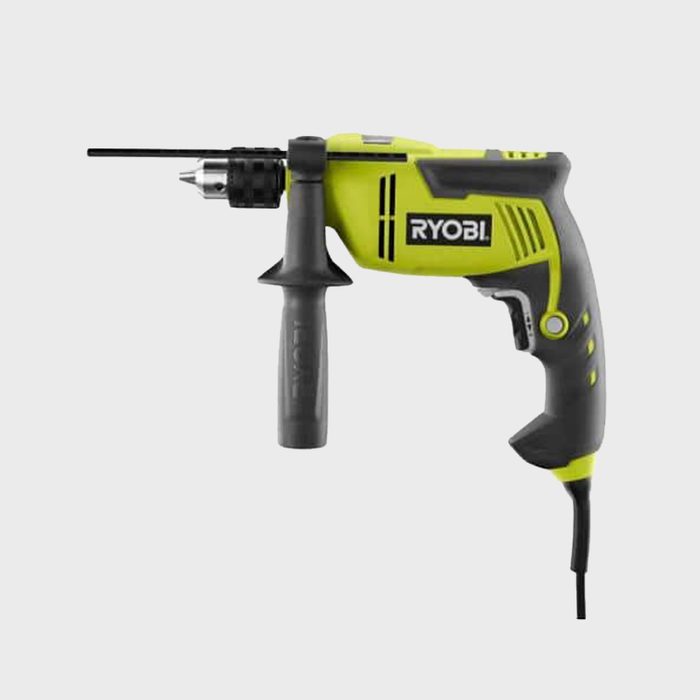
Best Budget Corded Hammer Drill
The Ryobi D620H hits the budget sweet spot of performance and affordability. It’s an excellent choice if you want the expanded capability of a hammer drill without making a major investment. I especially like the 5/8-inch keyed chuck on this model because it accommodates larger bits.
However, a few features reflect its budget nature. A dial, rather than trigger pressure, controls the variable speed. And the six-foot power cord is slightly shorter than some others on this list. Backed by Ryobi’s three-year warranty, it ships with an auxiliary side handle and a depth rod.
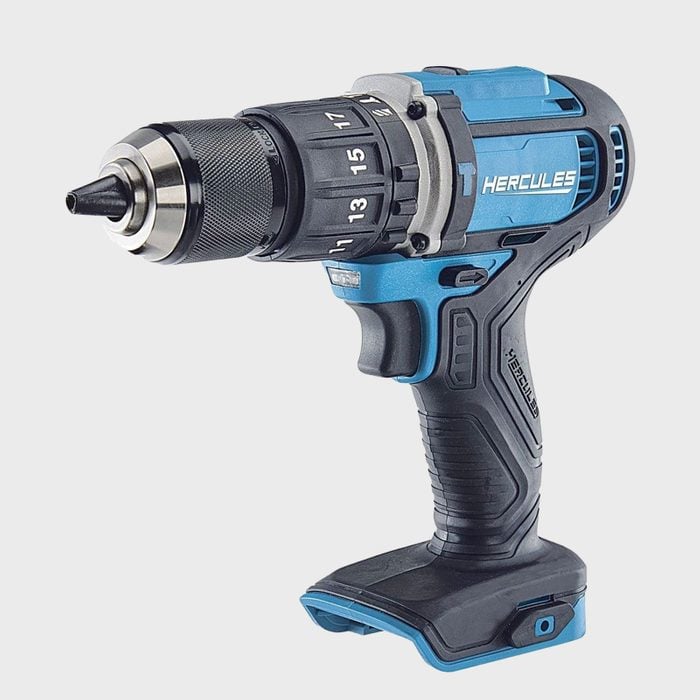
Best Budget Cordless Hammer Drill
If you’re looking for an affordable entry point to hammer drills, check out the 20V Hercules Hammer Drill from Harbor Freight. It covers the basics at a wallet-friendly price. Note that it’s sold as a bare tool. Unless you already own another Hercules cordless product, you’ll need to purchase a charger and battery as well.
This drill features a two-speed motor with metal gears, a keyless chuck, a multi-step clutch and a mid-body grip. It’s a good choice for DIYers who want the hammer function on their drill/driver.
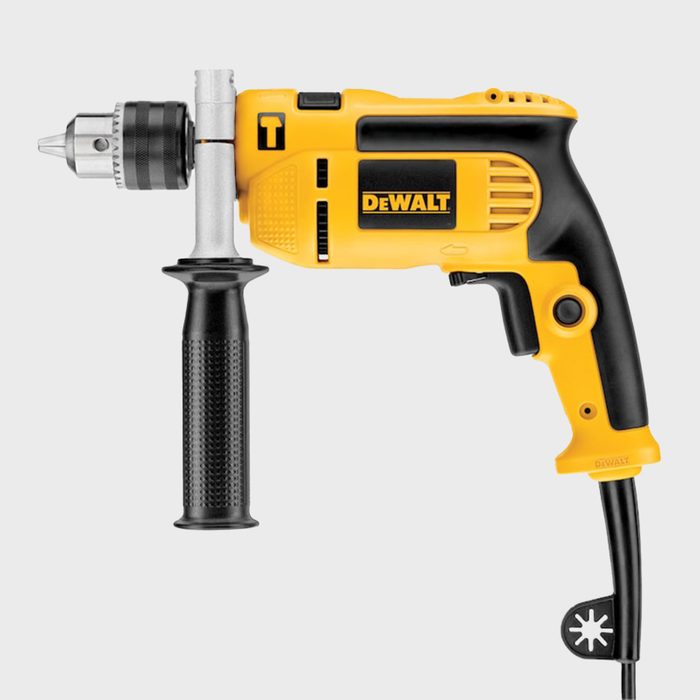
Best Mid-Range Corded Hammer Drill
So many DeWalt products make our drill roundups, and for good reason—tools like the DeWalt DW511 Hammer Drill provide quality performance at a DIY-friendly price. The DW511 comes with a 1/2-inch keyed chuck, variable speed, a 360-degree side handle, depth rod and eight-foot power cord. It’s covered by a three-year warranty.
It’s not our Best Value pick; the Ridgid R50111’s higher amperage rating, trigger lock and higher bpms edged it out. But if saving a little cash outweighs those performance gains, then add this pick to your list of contenders.
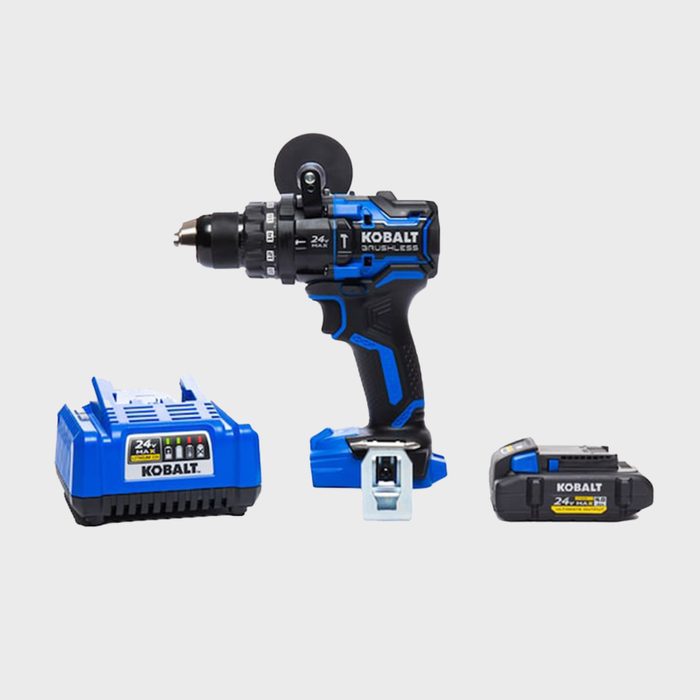
Best Hammer Drill for Anti-Kickback
Anti-kickback is a terrific safety feature in a hammer drill. If the bit begins to bind, the chuck cuts off rotation. It’s not immediate, so there is still some spin, but it happens fast enough that you will most likely avoid injury. The Kobalt 24-Volt Max XTR Hammer Drill is the only anti-kickback product we’ve seen that delivers a rich set of features at an affordable price.
The 24V Max XTR features a brushless motor, variable-speed trigger, built-in LED work light and three modes to allow easy transitions between hammer drill, drill and driver. It ships with a charger and single battery. Warranties run five years for the drill and three years for the battery.
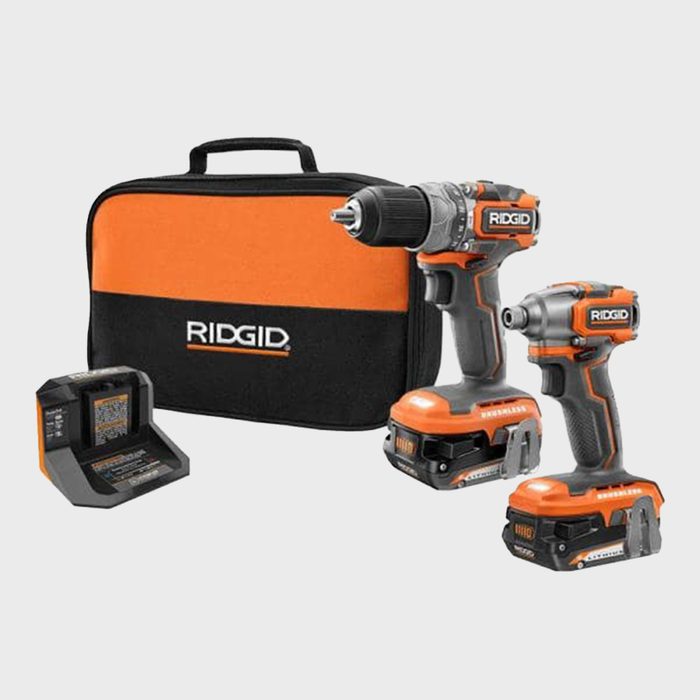
Best Cordless Hammer Drill Combo Kit
Shopping for a hammer drill and impact driver? Why not bundle them with the Ridgid R9208 Combo Kit? This kit packs value into its price with a pair of 18V cordless drills. The model R86115 1/2-inch hammer drill offers a brushless motor, two-speed metal gearbox, keyless chuck and a mid-handle grip. The impact driver, model R862311, also features a brushless motor.
This kit comes with a charger, two batteries, a side handle for the hammer drill and a tool bag to keep it all tidy and dry. It’s all backed by Ridgid’s lifetime service agreement.
Types of Hammer Drills
- Standard hammer drills: These can drill into tough surfaces like masonry by combining a regular rotating motion with a hammering action. They are suitable for basic masonry drilling tasks.
- Rotary hammer drills: Rotary hammer drills typically have a piston mechanism that provides a more powerful hammering action, making them suitable for more heavy-duty masonry work. They are commonly used in construction for drilling larger holes in concrete or masonry.
- Demolition hammer drills: These drills are designed for heavy-duty tasks such as breaking up concrete or other tough materials. They often have a dedicated hammer-only mode and may come with chiseling attachments for demolition work.
- Slotted drive system (SDS): SDS is a type of chuck system that allows for quick and easy bit changes without the need for a key.
- Combination hammer drills: These drills can switch between standard drilling, hammer drilling and sometimes chiseling modes, offering flexibility for a variety of tasks.
What to Consider When Buying a Hammer Drill
- Variable speed: Most drills offer this option by trigger pressure or a separate control setting. Variable speed is helpful in hammer mode, and pretty much essential if you use your hammer drill as a driver.
- Corded or cordless: A hammer drill is a serious tool, and drilling through masonry or concrete drains batteries quickly. However, modern cordless tools offer more power and lifespan than ever before. Plus, going cordless helps if you plan to use it as a drill/driver.
- Chuck style and size: The chuck holds the drill bit in place. Hammer drills tend to have larger chuck sizes to accommodate larger bits. Almost all are at least a 1/2-inch, while some hold up to 5/8-inch bits. Keyless chucks tighten or loosen by hand, while traditional keyed chucks require a special tool called a chuck key. Hammer drills often have keyed chucks to resist loosening during high-impact hammering.
- Handle position: A pistol grip handle allows the user to place more weight directly behind the drill bit. This leads to faster drill times but often requires a side handle for stability. If you plan to use the drill as a standard drill/driver most of the time, then look for a mid-body grip.
- Trigger lock: Because drilling through dense material can be time-consuming, some hammer drills offer a trigger lock so you can operate it without holding down the trigger. This reduces hand fatigue and can make a noticeable difference on large projects. If you’ll only be drilling the occasional hole, however, it isn’t a make-or-break option.
- Motor build quality: A brushless motor means the tool will last longer and generate less heat. Metal gears can take more wear and tear, while a metal enclosure will dissipate heat faster than a plastic one.
Why You Should Trust Us
Drawing on my background as a former residential remodeler, commercial site supervisor and maintenance manager, I bring extensive knowledge shaped by years of hands-on experience in the construction and DIY field. Throughout my career, I’ve engaged in nearly every facet of building and DIY projects, spanning from project planning and permitting to hands-on tasks such as plumbing, basic electrical work, drywall installation, carpentry, tiling, painting and beyond. With substantial experience in both residential and commercial settings, I have a comprehensive understanding of the intricacies involved in these projects, assuring that the information provided is firmly rooted in practical, real-world expertise.
How We Found the Best Hammer Drills
As shopping experts, our only job is to help you find a winning product. We start with the research and reporting basics—what products are made of, what they look like and how much they cost—to ensure that we’re only recommending the buys that are worth your time and money. Then, we research the features that speak to the product’s quality, taking advice from industry insiders and subject matter experts on what makes a product a smart value (or worthy of a splurge). Finally, we do the work of combing through user reviews to see how real people interact with the product, and if it stands up to the test.
FAQ
What is the difference between a hammer drill and a regular drill?
A regular drill is designed for drilling holes in softer materials like wood, plastic and metal by spinning the drill bit into the material. On the other hand, a hammer drill is specifically made for tougher surfaces such as masonry and concrete. It not only rotates the drill bit but also has a hammering action that helps break up the hard material, making it more effective for drilling into challenging surfaces.
What is the best use for a hammer drill?
Common applications for a hammer drill include tasks like installing anchors and drilling holes for screws or bolts in concrete walls or floors. The added hammering function makes the hammer drill a valuable tool in construction, renovation and other projects that involve working with hard surfaces where a regular drill might struggle.
Is a hammer drill worth it?
Whether a hammer drill is worth it depends on the type of project you’re doing. If you frequently work with hard materials like concrete, masonry or stone, a hammer drill is highly valuable. Its ability to combine rotary drilling with a hammering action makes it much more effective in penetrating tough surfaces compared to a regular drill. For general household tasks or working with softer materials, a regular drill might suffice.
What is the expected life of a hammer drill?
This depends on the brand, build quality, maintenance and frequency of use, but they can generally last anywhere from five to 10 years. Regular cleaning, lubrication and adherence to manufacturer guidelines can maximize the tool’s lifespan.
